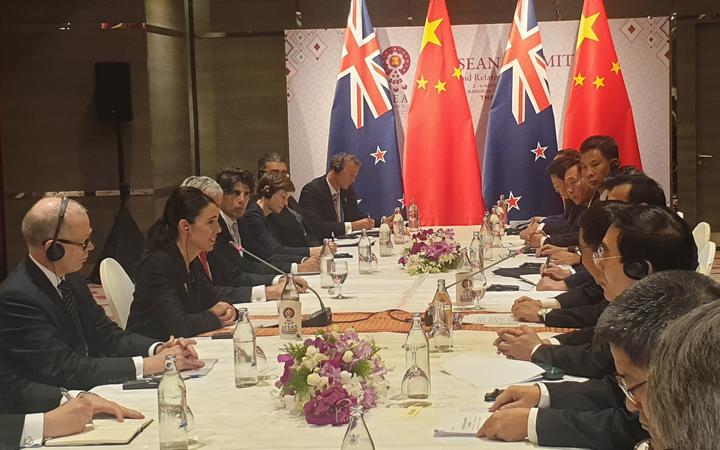After years of negotiations, New Zealand and China have struck a deal on the long-awaited upgrade to their free trade deal.
It includes new rules to make exporting to China cheaper and easier, the highest level of commitment to environmental standards China has made in any free trade deal, and giving the vast majority of wood and paper trade to China preferential access over the next 10 years.
That will include some processed wood products, for which the forestry sector had been seeking tariff cuts.
In return, New Zealand will adjust visa rules for some jobs here, including tour guides and Mandarin language teachers, but the overall number of visas allocated will not change.
Prime Minister Jacinda Ardern made the announcement at the East Asia Summit, where she's just met with Chinese Premier Li Keqiang.

"This ensures our upgraded free trade agreement will remain the best that China has with any country," she told reporters.
The original deal was signed in Beijing in 2008; so far that has trebled two-way trade between New Zealand and China from about $8 billion a year, to more than $28 billion.
- Jacinda Ardern announces upgrade on free trade agreement with China
- Defence Minister Ron Mark hopes China 'adheres to openness and transparency like we do'
- Defence paper seen as pushing back on China's Pacific influence
- Defence Capability 2019 – reading between the lines
Upgrade talks were given some momentum after Ms Ardern's trip to Beijing in April, with leaders pledging upgrade talks should proceed "as soon as possible".
Protections in the original agreement relating to overseas investment rules and the Treaty of Waitangi remain unchanged, she said.
The upgrade deal reflected the importance "both countries place on our relationship and builds on the significant mutual benefits both countries have enjoyed as a result of our excellent existing FTA", said Ms Ardern.

The next steps would be legal verification of the draft text, with the signing and release of the text expected in early 2020.
New chapters have been added to the deal under the upgrade on "Electronic Commerce, Environment and Trade, Competition Policy and Government Procurement", which the government said reflected "advances in trade rules and business practices over the past decade".
There have been no changes for dairy, with the government believing the sector had as a good deal as possible under the original deal - under that dairy tariffs will be completely removed for most products by 2022, and milk powder by 2025.
Details of the new deal include:
- New rules that will make exporting to China easier and reduce compliance costs for New Zealand exports by millions of dollars each year. This includes, for example, faster border release of fresh food products, and other products that may have transited through other countries en route to China.
- The introduction of environmental considerations - the most ambitious environment chapter and the highest level of commitment that China has agreed in any FTA. It includes commitments to promote environment protection and ensure that environmental standards are not used for trade protectionist purposes.
- The upgrade will also mean that 99 percent of New Zealand's $3b wood and paper trade to China will have preferential access, with tariff elimination over a 10 year implementation period on 12 additional wood and paper products worth NZ$36 million in trade to China.
- Some adjustments will be made to the visa allocations for the Movement of Natural Persons chapter of the existing FTA. The allocations will be increased for Chinese Tour Guides (from 100 to 200 places) and Mandarin Teaching Aides (from 150 to 300 places) by redistributing from other less used visa categories. There will be no change to the overall visa cap of 800.




